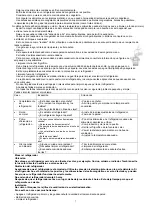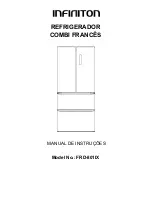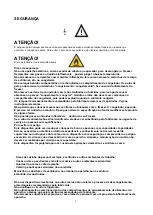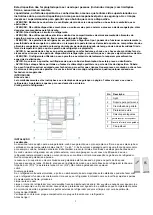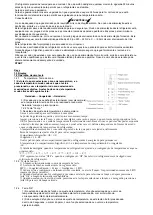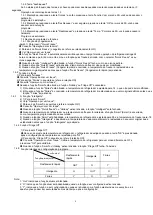
7
·Leave cooked food to cool completely.
·Chill food in a Fridge before freezing if possible.
·Consider how you want to cook the food before freezing it.
·Don’t freeze food in metal containers as you may want to microwave it straight from the Freezer.
·Use special Freezer bags available from supermarkets, Freezer film, polythene bags, plastic containers, aluminum foil for
acidic foods(such as citrus fruits).
Do not use thin cling film or glass. Do not use used food containers (unless cleaned thoroughly first).
·Exclude as much air from the container as possible. You could buy a special vacuum pump which sucks excessive air out
of the packaging.
·Leave a small amount of “air space” when freezing liquids, to allow for expansion.
·You can use the space in the Freezer most efficiently if you freeze liquids(or solids with liquids, such as stew) in square
blocks.
This is known as “performing” Pour the liquid into a polythene bag which is inside a square sided container.
Freeze it like this, then remove it from the container and seal the bag.
Defrosting
This appliance is designed as automatic defrosting ,no need to defrost by hand.
Recommended storage periods
For recommended food storage time, refer to the information given on your food packaging.
Cleaning inside the Refrigerator
You should clean the Refrigerator internally with a weak solution of bicarbonate of soda. Then rinse with
warm water using a damp sponge or cloth and wipe dry. Wash the baskets in warm soapy water and ensure
they are completely dry before replacing in the Refrigerator.
Cleaning outside the Refrigerator
Use standard non-abrasive detergent diluted in warm water to clean the Refrigerator exterior.
The grille of the condenser at the back of the Refrigerator and the adjacent components can be vacuumed using a soft
brush attachment.
Do not use harsh cleaners, scouring pads or solvents to clean any part of the Refrigerator
Simple fault analysis and elimination
Not every failure requires technical service personnel to solve the following simple small problem; you can try to solve the
problem.
Case
Inspection
Solutions
•
Completely
non
refrigeration
•
Is power plug off?
•
Are breakers and fuses a broken?
•
No electricity or line trip?
•
Re-plug.
•
Opening the door and checking whether the lamp
is lit.
•
Abnormal
noise
•
Is refrigerator stable?
•
Does refrigerator reach the wall?
•
Adjusting refrigerator’s adjustable feet.
•
Off the wall.
•
Poor
refrigerating
efficiency
•
Do you put hot food or too much
food?
•
Do you open the door frequently?
•
Do you clip food bag to the seal of
door?
•
Direct sunlight or near a furnace or
stove?
•
Is it well-ventilated?
•
Temperature setting in too high?
•
Putting food into refrigerator when hot food
becomes cool.
•
Checking and closing the door.
•
Removing the refrigerator from the heat source.
•
Emptying the distance to maintain good
ventilation.
•
Setting to the appropriate temperature.
•
Peculiar smell
in refrigerator
•
Any spoiled food?
•
Do you need to clean refrigerator?
•
Do you packed food of strong
flavors?
•
Throwing away spoiled food.
•
Cleaning refrigerator.
•
Packing food of strong flavors.
Moving the Refrigerator
Location
Do not place your Refrigerator near a heat source, eg. Cooker, boiler or radiator. Also avoid direct sunlight in out-buildings
or sun lounges.
Leveling the Refrigerator
Make sure the Refrigerator is level. Use the rotating leveling feet at the front. If the Refrigerator is not level, the doors and
magnetic seal alignments will be affected and may cause your Refrigerator to work incorrectly.
Do not turn on the Refrigerator for 4 hours
After the Refrigerator is in place it needs to be left for 4 hours. This allows time for the coolant to settle.
Installation
Don’t cover or block the vents or grilles of your appliance.
If you're not at home for a long time
•
Turn off the refrigerator first and then unplug the unit from the wall outlet.
•
Remove all the food.
•
Clean the refrigerator.

















